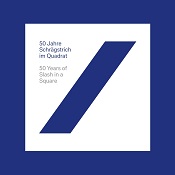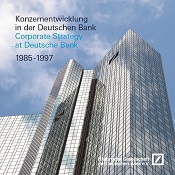Various Studies
 |
50 Years of Slash in a SquareMünchen: Prestel, 2024, 136 pp., bilingual English/German, ISBN: 978-3-7913-9322-3 In April 1974, Deutsche Bank presented its new logo - the soon-to-be-famous "slash in a square". This was preceded by a competition to which the company had invited eight internationally renowned graphic designers. From 140 designs, the bank chose a proposal by Anton Stankowski, master of constructivism and pioneer of graphic design. The "slash in a square" has long since become the unmistakable trademark of Deutsche Bank. The generously illustrated book publication, which is being published to mark the 50th anniversary, describes the impressive range in which the logo has been used since then, recalls company logos that Deutsche Bank previously used, takes a look at the importance of the artist Anton Stankowski and provides ideas about possible future applications. Members of the Historical Association receive a copy free of charge! |
 |
Hans-Peter Ferslev - Corporate Strategy at Deutsche BankSpecial edition for the Historical Association of Deutsche Bank, 2017, 80 pp., bilingual English/German By jotting down his recollections of Deutsche Bank department Group Strategy (AfK), having been encouraged to do so by former colleagues, Hans-Peter Ferslev provides readers with an insight into one of the key transformative periods in Deutsche Bank’s recent history. The years from 1985 to 1997, which form the focal point of this narrative, document the gradual demise of ‘Germany plc’, the radical restructuring of Deutsche’s domestic operations, the intensified internationalization of the banking industry and the transition towards a capital-markets-based investment banking business shaped by Anglo-American values. It is likely that the staff of AfK were more closely involved than almost any other group in the bank’s response to these changes and in the search for strategic solutions. Members of the Historical Association receive a copy free of charge |
 |
Hermann Wallich - A Banker in Paris, Shanghai and BerlinHentrich & Hentrich, 2017, 94pp Hermann Wallich (1833–1928) was a leading figure in helping shape the fortunes of Deutsche Bank for almost 25 years and supported it in becoming the largest credit institution in the country. He was predestined for this role. Hermann Wallich was born into an established Jewish family in the Rhineland. At an early age he became acquainted with the international banking business. His path took him from Paris to Réunion, Shanghai and Yokohama. So he was already an acknowledged expert on the overseas market when monetary expert Ludwig Bamberger recruited him for the new Deutsche Bank. The primary business of the institute was to provide financing for foreign trade, particularly overseas. Wallich consented and found his vocation. Members of the Historical Association receive a copy free of charge |
 |
Harold James – The Nazi Dictatorship and the Deutsche BankCambridge University Press, 2004, 286pp This study is a completely revised new edition of the chapter on the role of Deutsche Bank in the Nazi Dictatorship from the 1995 anniversary volume. In this expanded version, the author has evaluated the numerous new archival holdings in German and international archives and summarized the research findings of recent years. |
 |
Harold James – The Deutsche Bank and the Nazi Economic War Against the JewsCambridge University Press, 2001, 220pp. This book examines the role of Deutsche Bank in the expropriation of Jewish-owned enterprises during the Nazi dictatorship. The author uses new and previously unavailable materials, many from the bank's own archives, to examine policies that led to the eventual genocide of European Jews. |